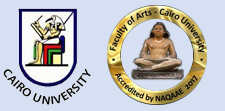عنوان المقال عربي
أدب الذكاء الاصطناعي البدايات والتحول
Document Type
Original Study
Subject Area
Language and Literature
Keywords English
artificial intelligence - digital literature - electronic literature - machine literature - philosophy of artificial intelligence.
كلمات مفتاحية عربي
الذكاء الاصطناعي-الأدب الرقمي-الأدب الإلكتروني-أدب الآلة-فلسفة الذكاء الاصطناعي
Abstract English
Artificial intelligence literature was a myth formed by man in his imagination decades ago, and it was often depicted as his enemy, seeking to compete with him in this life and to have equal rights between them, and sometimes even went beyond controlling and controlling him. With the development of computer programs, the outlook began to change towards this myth, which began to be somewhat realized in our contemporary reality. The character of artificial intelligence began to appear among literary characters that are characterized by characteristics of good and evil, some of which are beneficial and harmful. Artificial intelligence began to appear in reality as a participant and producer of literary texts through... Several historical stages, as the computer began to contribute to producing texts and adding audio and visual technical features to them. It also allowed the recipient to interact with the text and participate in receiving it, as in the stage of digital literature that preceded the current stage of artificial intelligence. The stage of artificial intelligence literature began with simple beginnings, as researchers conducted experiments on some personal computers to train them to produce text for another writer after entering many texts for him. These attempts continued until we reached a stage where artificial intelligence programs were able to produce texts on their own without the programmer interfering in entering specific texts. As current artificial intelligence possesses huge data through which it can produce multiple texts to which the user can specify some requirements and it can respond directly to it. Researchers were divided regarding the quality of the literature produced by artificial intelligence. Some supported these beginnings, others doubted that, as they were texts that did not carry human feelings and were written in an artificial manner, while some saw the possibility that its performance would improve in the near future.
الملخص العربي
كان أدب الذكاء الاصطناعي أسطورة شكلها الإنسان في مخيلته منذ عقود سابقة، وكثيرا ما صورت على أنها عدو له، تسعى لأن تنافسه في هذه الحياة وأن تتساوى الحقوق فيما بينهما، بل تعدت أحيانا لأن تسيطر عليه وتتحكم فيه. ومع تطور برامج الحاسب الآلي بدأت النظرة تتغير نحو تلك الأسطورة التي بدأت تتحقق نوعا ما في واقعنا المعاصر، فبدأت شخصية الذكاء الاصطناعي تظهر ضمن الشخصيات الأدبية التي تتسم بسمات الخير والشر، فمنها النافع والضار، وبدأ الذكاء الاصطناعي يظهر في الواقع مشاركا ومنتجا للنصوص الأدبية من خلال مراحل تاريخية عدة، حيث بدأ الحاسب الآلي يسهم في إخراج النصوص ويضيف عليها سمات تقنية صوتية ومرئية، كما أنه أتاح للمتلقي التفاعل مع النص والمشاركة في تلقيه كما في مرحلة الأدب الرقمي التي سبقت مرحلة الذكاء الاصطناعي الحالية. وبدأت مرحلة أدب الذكاء الاصطناعي ببدايات بسيطة حيث قدم الباحثون تجارب على بعض الحواسب الشخصية لتدريبها على إنتاج نص لأديب ما بعد إدخال نصوص عديدة له، واستمرت تلك المحاولات حتى وصلنا إلى مرحلة استطاعت برامج الذكاء الاصطناعي أن تنتج بنفسها نصوصا دون أن يتدخل المبرمج في إدخال نصوص محددة، حيث إن الذكاء الاصطناعي الحالي يمتلك بيانات ضخمة يستطيع من خلالها أن ينتج نصوصا متعددة، يستطيع المستخدم أن يحدد له بعض المتطلبات فيستجيب له بشكل مباشر. وانقسم الباحثون في جودة ما ينتجه لذكاء الاصطناعي من أدب فبعضهم أيد تلك البدايات، وشكك بعضهم بذلك حيث إنها نصوص لا تحمل مشاعر إنسانية كما أنها كتبت بأسلوب مصطنع، بينما رأى بعضهم إمكانية أن يتحسن أداؤه في المستقبل القريب.
Recommended Citation
MUHMMAD MUGIM ALMUGIM ALMUGIM, TARIQ
(2024)
"Artificial Intelligence Literature Beginnings and Transformation,"
Journal of the Faculty of Arts (JFA): Vol. 84:
Iss.
3, Article 13.
Accept Date
2024-04-30
Publication Date
7-1-2024

